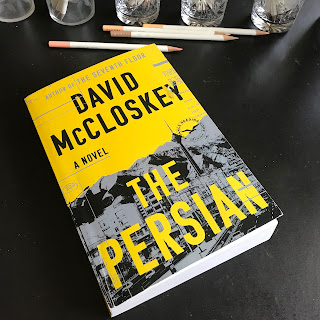How prescient it is that The Persian would arrive on my doorstep the very week that Israel bombed Iran. I watched the news in disbelief and then opened this novel to find it all the more believable.
June 29, 2025
The Persian by David McCloskey “Whatever the Mullahs say, Paradise is a fluid concept.”
How prescient it is that The Persian would arrive on my doorstep the very week that Israel bombed Iran. I watched the news in disbelief and then opened this novel to find it all the more believable.
June 23, 2025
Grace
I saw a long, fat, black-beaded wallet at the cash register where I was paying for my bar cookies at Whole Foods this afternoon.
I looked questioningly at the man who had just paid ahead of me, but he shrugged. “It’s not mine,” he said, quietly smiling at me.
“Here,” I said to the girl taking my money. (“That will be $8.15,” she said, and when I told her I’d give her the fifteen cents she said what they all say now, the clerks who can no longer count back change, “I’ve already put it in the system.”)
“Someone left this,” I said. “Save it for when she comes back looking for it.”
Just then, the most frantic woman came rushing up.
“Don’t worry!” I said, “We have it!”
“Oh,” she said. “I’ve been searching my car and this is the last place I was. Other than the bank. I was at the bank before coming here, and there was so much money…”
“Don’t worry,” I said, putting my arms around her. “He is with us. He is with you.”
I would have said more but for the line behind us, stomping their feet as they do. “Patience,” I thought. “Just have a little patience, people.”
And then I remembered myself, driving up 75th Street on this day of 94 degree Fahrenheit temperatures, where someone was crossing without waiting for the little lit up figure to come up on the traffic light. “You asshole,” I mutter, under my breath, because I’m hot, and crabby, and I have to wait for this man who will not obey the rules.
It is so easy for one good thing to be undermined by the bad thing I’ve done just before. “Lord,” I pray, “give me the grace to be gentle with others.”
Amen.
June 12, 2025
The Passengers on the Hankyu Line by Hiro Arikawa
The stories of the passengers on The Passengers on The Hankyu Line, by Hiro Arikawa, are linked together like the cars of a train. They are connected, and propelled, by the people who inhabit them.
At first, I wondered if an elderly woman with her granddaughter was the conduit through which wisdom flowed. After all, she suggested that Shoko, the resentful and bitter woman coming home from her fiancé’s wedding to a work colleague, stop at a certain town. This town, Obayashi, proved to be a delightful respite which calmed Shoko’s spirit as she gazed at the swallows and the way the townspeople cared for them.
The grandmother also suggested to Misa, after witnessing horrible verbal abuse thrown out by her boyfriend, that Misa find someone better. After the elderly woman and her granddaughter leave, Misa thinks, “Why am I dating such a jerk?”
But, as the novel progresses, we see that she is not the only one who has a positive effect on the lives of the passengers in this train. The passengers learn more about themselves by listening to, and observing, one another.
Although each passenger’s story is unique we see them grow and change, especially as the train begins its return trip back through each station it has taken us.
All manner of people from every walk of life - solo passengers, friends, couples, families, work colleagues - traverse the concourse at a brisk pace.
But as they cross paths, the contents of each traveler’s heart are a mystery known only to themselves.
Yet, despite the mystery, I agree with one of them who says, “Come to think of it, I owe a certain gratitude to strangers.” It is an appreciative attitude to take, especially when we find ourselves surrounded by others from whom we are quite different.
Thanks to Berkley Books for the opportunity to read and review The Passengers on the Hankyu Line by Hiro Arikawa, translated by Allison Markin Powell.
Hiro Arikawa is a renowned author from Tokyo. She is the international bestselling author of THE TRAVELLING CAT CHRONICLES and THE GOODBYE CAT. Her enduring classic title,PASSENGERS ON THE HANKYU LINE, has sold over a million copies in Japan and beyond.
Allison Markin Powell won the PEN Translation Prize for her translation of Hiromi Kawakami’s The Ten Loves of Nishino and is also the translator of Kawakami’s Strange Weather in Tokyo and The Nakano Thrift Shop as well as Shunmyo Masuno’s The Art of Simple Living and works by Osamu Dazai, Fuminori Nakamura, and Kanako Nishi, among others. She maintains the online database Japanese Literature in English.

